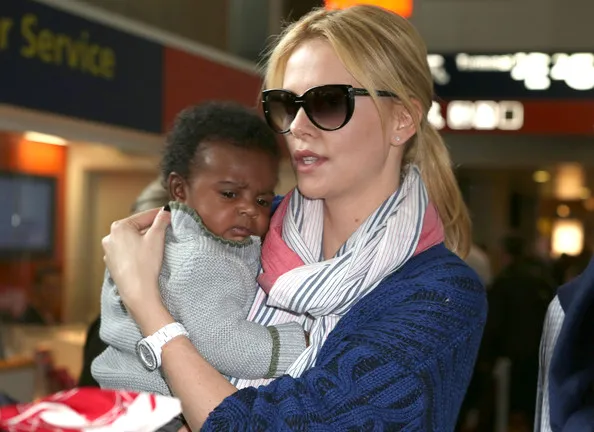Why Do So Many White Celebs Adopt Non-White Children?
Ever wonder why white celebrities adopt non-white children? Me too, it doesn’t make us evil to explore this “curiosity”.

Ever wonder why white celebrities adopt non-white children? Me too, it doesn’t make us evil to explore this “curiosity”.
The trend of famous white individuals adopting non-white children has stirred up curiosity and conversation. From Angelina Jolie to Madonna, celebrity adoptions from foreign countries have made headlines. While this can be seen as an act of love and compassion, it raises some thought-provoking questions about the deeper motivations behind these decisions.
The Appeal of International Adoptions
One of the main factors is the ease of international adoptions, particularly from countries with fewer regulations compared to the U.S. Many celebrities express the desire to help children from underprivileged backgrounds in what some describe as a “god complex”. Countries like Ethiopia or Cambodia offer quicker processes, compared to the more extensive vetting and restrictions often found in American adoption agencies.
Additionally, adopting from a foreign country often resonates with people as a noble humanitarian effort. In the eyes of some, adopting internationally symbolizes a rescue mission, giving the child a chance for a better life in a wealthy, stable home. This narrative has been heavily publicized by media outlets, portraying it as a “savior” narrative — another layer in the complex motivations for international adoption.
Is There a “Savior Complex” at Play?
Critics argue that some celebrities may be unconsciously driven by a “white savior complex,” where they see themselves as rescuers of children from impoverished, war-torn, or otherwise disadvantaged countries. While the desire to help may be genuine, some critics believe this mindset oversimplifies the challenges these children face in their home countries and may even perpetuate the idea that Western lifestyles are superior.
It also raises the question: Why aren’t more white celebrities adopting from within their own country? The U.S. has plenty of children in need of adoption, particularly from minority backgrounds. Some argue that adopting internationally is easier to publicize and garners more positive press than adopting domestically. The image of a celebrity flying to an exotic country to “rescue” a child can have a profound media impact. A public relations photo opt.
Avoiding American Bureaucracy
One reason some celebrities turn to international adoption is to sidestep the complex bureaucracy and lengthy wait times associated with domestic adoption. The U.S. adoption system involves strict guidelines, background checks, home studies, and sometimes years of waiting. Celebrities with busy careers may not have the time or patience for such a process, making international adoption a more appealing option.
However, avoiding U.S. bureaucracy doesn’t necessarily mean that these children face less scrutiny or receive proper emotional care in the long run. International adoption comes with its own set of challenges, including the complexities of adjusting to a new culture, language, and racial identity.
Adopting Non-White Children: A Trend or a Statement?
In some cases, the adoption of non-white children by white celebrities can be seen as a trend, influenced by societal ideals of diversity and inclusivity. In Hollywood, where public perception matters, adopting a child of a different race can present a progressive, humanitarian image, signaling a commitment to global issues. This is especially true in an era where racial justice and equality are hot-button issues.
But is this focus on diversity helping or hurting the children involved? Critics argue that while adoption is undoubtedly life-changing for the child, it can sometimes be treated as a fashion statement rather than a deep, intentional act of parenthood. This can lead to issues with the child’s identity as they grow older, particularly when they are adopted into predominantly white environments.
Challenges of Raising a Child of a Different Race
Parenting across racial lines comes with unique challenges. White parents of non-white children must be prepared to address issues of race, culture, and identity as the child grows up. Living in a largely white, affluent world may distance the child from their ethnic heritage, and parents must ensure they don’t unintentionally isolate the child from their roots.
In some cases, celebrities have been praised for incorporating their children’s culture into their lives, but others have faced backlash for failing to do so. It’s important for parents to acknowledge and respect their child’s background, providing them with a strong sense of self and cultural pride, something that’s often overlooked when adoption is framed as an act of rescue.
What About the Kids?
It’s essential to remember that these children are not just part of a celebrity’s image or personal journey; they are individuals with their own stories, struggles, and needs. While celebrities are often in a better financial position to offer children a life of material comfort, it doesn’t erase the emotional and cultural complexities they’ll encounter.
Conclusion: A Complex Choice
While adopting non-white children may stem from a genuine desire to provide a better life, the motivations and long-term effects of these decisions warrant deeper consideration. Is it about helping children, or is it also influenced by the need to project a certain image? The answers aren’t simple, and for many, this topic sits in a gray area between altruism and optics.
In my opinion it’s a “god complex” mixed with disingenuous public relations aspirations with a dash of desperately reaching for relevance. I guess it’s noble on paper, but these kids are little more than guinea pig accessories for said celebs.





